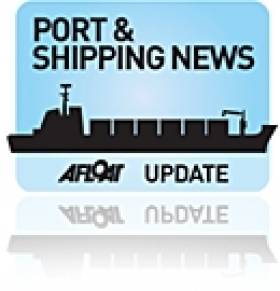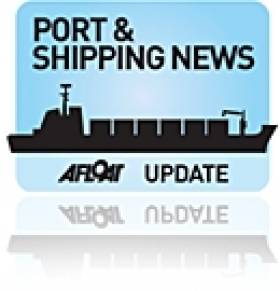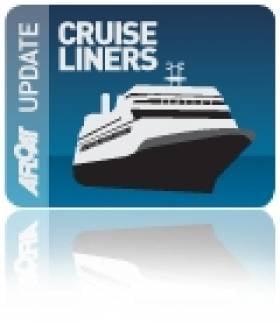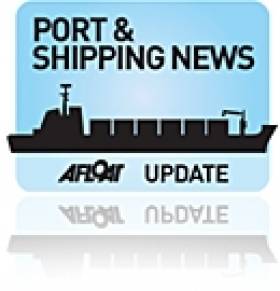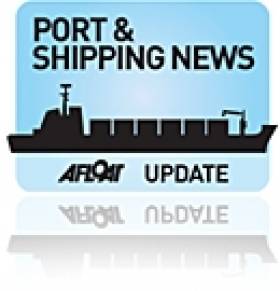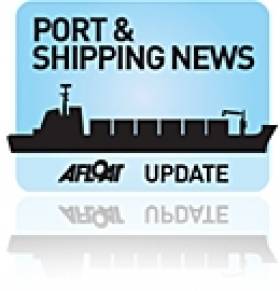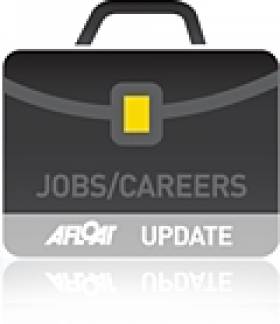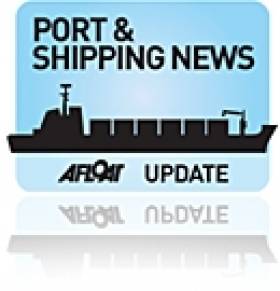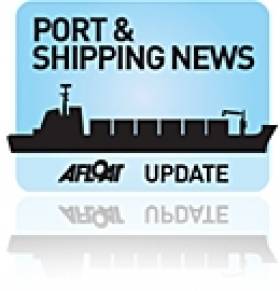Displaying items by tag: Irish Maritime Development Office (IMDO)
Irish Ports and Shipping Volumes Remain Steady in Third Quarter
#PORT & SHIPPING – According to the Irish Maritime Development Office (IMDO) the volume of port and shipping traffic through the Republic of Ireland remained relatively stable in the third quarter of 2012.
The latest analysis of the traffic data indicates that two of the five principal freight segments returned to growth in the third quarter, two declined and one remained unchanged.
Lift-on/lift-off (Lo/lo) trades declined 2%
Container traffic (Lo/lo) has declined by 2% during the third quarter of this year. Exports, as a subset of these figures fell for the second consecutive quarter, declining by 3% as weaker demand conditions prevailed, particularly in the Euro zone area. However, exports to other markets in Asia, South Africa, and both North and Latin America remained relatively firm. Imports declined by 1%, representing the 19th consecutive quarter of declining import volumes. However, the rate of decline in this segment has eased considerably over the course of 2012, possibly indicating the market might be finally bottoming out.
Roll-on/Roll-off (Ro/ro) traffic was unchanged at 0%
Roll-on/roll-off (ro/ro) traffic remained unchanged in the Republic of Ireland for Quarter 3 compared to the same period last year. The majority of ro/ro freight from Ireland is destined for Great Britain which continues to underperform, with leading economic indicators recording weaknesses in the retail and manufacturing sectors. Nonetheless, this is a slight improvement for this shipping market segment having recorded two consecutive quarterly declines earlier this year.
Dry bulk volumes increased by 13%
Dry bulk shipments, which make up the largest volume of traffic throughput at Irish ports, grew by 13% during the third quarter of 2012. Improved domestic demand for agricultural products contributed to the rise while exports of ores and other industrial commodities also performed well.
Tanker/Liquid bulk market increased by 9%
Liquid bulk volumes of tanker based petroleum products increased by 9% in the third quarter. This increase was primarily as a result of large volumes of crude oil being transhipped at Bantry Harbour's oil storage facilities. Excluding Bantry, volumes would have seen a decline of 8% in Quarter 3, which perhaps more accurately reflects domestic demand for petroleum products.
Break bulk volumes down by 10%
Break bulk volumes, which represent the smallest segment of the domestic market, continued to decline into Quarter 3, falling by 10% with no rise in demand for construction related materials such as steel or timber. Demand in this segment remains at historically low levels.
Outlook: The outlook for the remainder of the year appears to suggest slightly improved conditions in both import and export volumes. This is as a result of a modest pick up in seasonal trade observed during October and early November. Nonetheless, market demand conditions going forward into 2013 remain challenging. The Euro-zone officially entered into its second recession since 2009 during the third quarter this year, while continued uncertainty regarding Greece and some other member states still remains.
Globally, much focus has been on the slowdown in the Chinese and other Asian economies. The Irish growth forecast has also been revised downwards for 2013. Sentiment amongst major shipping lines and shipowners remains low. Many shipowners have to deal with a large over supply of shipping capacity in almost all sectors along with weak underlying trade demand, increased operating costs and record low charter markets.
Nominations Open for IEA ShortSea Operator of 2012
#PORTS & SHIPPING – Nominations are been sought for the Irish Exporters Awards 2012, which is to be held in November and hosted by Irish Exporters Association (IEA).
The role of the export sector has never been more important, and among the 13 award categories the IEA is being supported by the Irish Maritime Development Office (IMDO) in the search for the Short Sea Shipping Company of the Year 2012, a key category in the National Export Industry Awards.
The competition is to recognize the outstanding achievement in the delivery of maritime services to and from Ireland, while highlighting the strategically significant role it plays to our island economy. At the gala awards ceremony on 23rd November, which will culminate when the Taoiseach will present the category winner, and the overall Exporter of the Year.
Applications are available from: www.irishexporters.ie/action/ExportAwardsOnlineApplication
Strong First Half 2012 Cruise Call Season to Ireland
#CRUISE LINERS – According to the Irish Maritime Development Office (IMDO), a number of calls by international cruise ships to Irish ports, many on their maiden calls to this country, have visited within the first half of 2012.
Irish Ports had confirmed visits for 202 international cruise liners this year and so far they have welcomed a broad collection of vessels including Princess Cruises 'Grand' class liner Grand Princess in January which lead to the disembarkation of an estimated 4,000 visitors to Dublin Port.
Also calling to the capital as previously reported was the $250m luxury cruise liner MSC Lirica carrying almost 3,000 passengers and Cobh during the month of August. She is due to make a repeat call to both ports this weekend, firstly to the capital and then sailing overnight to Cobh.
Over the past two years, it has been estimated that the cruise ship industry has contributed €20.3 million to the island of Ireland.
With the increase in bigger liner ships calling to this country there are clear indications that the contribution that the cruise industry is making to the Irish economy will have a significant influence on the economic opportunities for the hinterland's of Irish host ports, and could be worth a potential €60 million over the next few years.
Most recently, at the Cruise Europe Conference 2012 held at Royal Greenwich, London, Captain Michael McCarthy of the Port of Cork, was unanimously elected Chairman of Cruise Europe. Captain McCarthy is currently serving as Commercial Manager with the Port of Cork Company.
Commenting on the Irish cruise business, the newly elected chairman of Cruise Europe, Captain Michael McCarthy said: "There are many indirect economic and tourism benefits to Ireland from the cruise sector, as well as the benefit of introducing Ireland to new markets and growing business opportunities. Cruise visits help to showcase Ireland's world class shore products, destinations and highlight all that Ireland has to offer visitors."
He continued: "One of Ireland's advantages is the strategic and geographic spread of its numerous ports, many of which are in close proximity to world class tourism destinations and it is with this in mind that Ireland will be promoted with the North and Atlantic European destinations to develop thriving and 'must see' destinations".
New Ship-Management Company Launched in Cork
#PORTS & SHIPPING NEWS – The Irish Maritime Development Office (IMDO) have welcomed a newly founded ship-management company, Barry Shipping, which started operations in Cork at the end of last year.
The company headed by Corkonian Owen Barry, provides ship management, crew management, project management, training and a range of other services for the maritime industry.
Glenn Murphy, director of the IMDO said "We wish Barry Shipping well with their new venture and look forward to providing them with further strategic and network support to assist them during their continued development".
Commenting on their future strategy Barry said, "The company's aim is to provide clients with creative and profitable solutions to meet and overcome some of the unique challenges in the current climate".
Barry graduated from Cork Institute of Technology (CIT) in 1996 and started his career with BP Shipping as an Engineering Cadet. This was followed by working with leading passenger operators Irish Ferries, P&O Cruises and Dobson Fleet Management where he served as Chief Engineer and Technical Superintendent. In 2009 he returned to Cork to run operations for Fastnet Line.
For more information about the new company, visit www.barryshipping.com
In addition for details about the role of the (IMDO) which is Ireland's national dedicated development, promotional and marketing agency for the shipping services sector click HERE
Export Industry Awards to Deep and Short Sea Shipping
Eucon Shipping and Transport Ltd won the Short Sea Shipping Company of the Year Award 2011, sponsored by the Irish Maritime Development Office (IMDO), which recognises the strategically important role of short sea shipping to our economy. Eucon offers Irish exporters access to worldwide markets via its regular feeder services to Rotterdam, Antwerp and Southampton operating from the ports of Dublin, Cork and Belfast. The other nominees were: CLdN RoRo S.A. and Grimaldi Lines.
In the category for the Logistics Company of the Year Award 2011, sponsored by Dublin Port Company, the award went to Caffrey International. The Co. Meath based company is a specialist provider of road transport and logistics services between Ireland, the UK and continental Europe.
The award recognises the importance of logistics and supply chain management firms to the exporting effort of companies trading internationally from Ireland. The other nominees were: DHL Global Forwarding (Ireland) Ltd., Dublin; Eucon Shipping and Transport Ltd. and Geodis Ireland Limited, Dublin.
ABC Nutrition of Shannon was presented with the overall award of the Exporter of the Year Award 2011 after winning in the Emerging Markets Exporter Award, one of twelve categories which were presented at the ceremony.
Applications for Short Sea Shipping Company of the Year 2011
Organised by the IEA in conjunction with the IMDO, the competition recognises the outstanding achievements and innovative activity of Short Sea Shipping companies in supporting Irish export industry through efficient import processing as well as export processing services.
The awards search is to culminate with a gala awards ceremony held in the National Convention Centre in Dublin's docklands on 11th November.
Applications forms to enter the category of The Short Sea Shipping Company of the Year 2011 are available on the IEA website; www.irishexporters.ie
Further information about the Export Industry Awards, in addition to information around export supports can also be found on www.irishexporters.ie or email: [email protected]
Opportunities in International Maritime Internships
A list of internships for the international maritime industry for 2011 has been announced and can be viewed on the Maritime Careers section posted on the Irish Maritime Development Office (IMDO).
The following companies: ABS, BP, Shell, Clarksons, Lloyds Register and the European Maritime Safety Association (EMSA) are offering a broad range of internship positions.
For further details on the internships and links to the companies, logon here
'Follow the Fleet' Schools Essay Competition
The Irish Maritime Development Office (IMDO) has announced details for the 2010/11 Follow the Fleet Schools Essay Competition. To enter the competition, schools are invited to log onto http://www.followthefleet.ie to register. Each school will be provided with a username and password.
This year the Follow the Fleet essay competition is centred on three themes: Maritime History, Maritime Trading in Ireland –Life of a Container and Technology and the Master Mariner. Within each theme there is a choice of three essay titles. You are free to choose an essay title from any of the themes listed.
To see the full list of essay titles, essay guidelines, entry forms,competition details and rules are please logon to http://www.imdo.ie/followthefleet/news.asp
Ferry Passenger Boost Recorded for First Half of 2010
The figures reflect the disruption to the aviation industry due to the ash-cloud that erupted from the Icelandic Eyjafjallajokull volcanic mountain in April. This contributed to a large volume in passengers making alternative travel plans by booking with ferry operators.
During the week of the main closure to European air-space, ferry operators noted a three-fold increase in the demand for foot-passenger bookings throughout the main Irish Sea routes. The IMDO estimate that an additional 106,000 passengers took the ferry option compared to the same time period in 2009.
On the continental routes between Ireland to France, volumes increased 25% in the second quarter of 2010. There are three routes operated by four ferry operators. Over 30% of the passenger market is conducted within the second quarter of 2010, marking the beginning of the tourist season. Therefore any increase in passengers volumes from this time is likely to have a positive impact for the balance of the full year figures.
In the months between March to May, the increase in sea-passengers was up 14% year-on-year. While the market demand on English Channel routes, which accounts for 90% of the traffic, saw passenger numbers surge 13% in the second quarter of 2010 compared to the same timeframe of the previous year.
The largest percentage increase in traffic, was recorded at Dublin Port, during the first 6 months of 2010, where passenger volumes rose by 25%. Earlier in the year, a new entrant into the Irish Sea market, Fastnet Line re-opened the Cork-Swansea route. In 2006 the 10-hour route was closed by Swansea Cork Ferries. The new operator provides 6 sailings weekly which are likely to have resulted in a boost to passenger tourist vehicles in the south-west region.
On an all-Ireland basis there are 5 operators operating between Ireland and the UK, and 2 operators between Ireland and France providing 60 daily sailings. Irish Sea operators are Stena Line, Irish Ferries, P&O (Irish Sea), Seatruck Ferries and DFDS Seaways (formerly trading as Norfolkline) until acquired by the Danish ferry and transport logistics company. On the continental services, Irish Ferries and Celtic Link Ferries operate out of Rosslare Europort while Brittany Ferries serves the Cork-Roscoff route.
For a detailed PDF of the figures please click attachment listed below. For further information about the IMDO logon to their website: www.imdo.ie



























